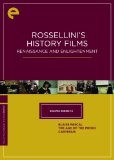| Reviews & Columns |
|
Reviews DVD TV on DVD Blu-ray 4K UHD International DVDs In Theaters Reviews by Studio Video Games Features Collector Series DVDs Easter Egg Database Interviews DVD Talk Radio Feature Articles Columns Anime Talk DVD Savant Horror DVDs The M.O.D. Squad Art House HD Talk Silent DVD
|
DVD Talk Forum |
|
|
| Resources |
|
DVD Price Search Customer Service #'s RCE Info Links |
|
Columns
|
|
|
Rossellini's History Films: Renaissance and Enlightenment - Eclipse Series 14
THE MOVIE:
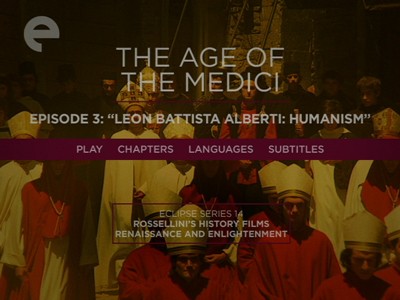
Rossellini's History Films: Renaissance and Enlightenment - Eclipse Series 14, and indeed, pretty much the whole of the latter decades of Roberto Rossellini's career, require a little context--something the folks at Criterion have gone out of their way to do in the liner notes of this Eclipse Series collection and, more extensively, in the bonus features of its companion release, The Taking of Power by Louis XIV. Without it, these films are likely to befuddle most viewers, particularly those who aren't familiar with Rossellini, but quite possibly those who are, as well.
One might be forgiven for thinking the three dry historical reenactments contained herein were created for the classroom. It's actually not that far from the mark. After his infamous declaration, "Cinema is dead," the great Italian director turned from the movie screen to the television screen with the express intention of using film as a learning tool to educate modern viewers about history and the meaning of world events. As one of the architects of the post-War Neorealist movement, Roberto Rossellini had already helped establish an aesthetic school of thought that tried to use the camera to show life as it was lived in an effort to get closer to the truth. The Neorealists considered cinema to be an art form in service to humanity, and using it properly was not just a political imperative, but a moral one. In the late 1950s, however, Rossellini saw the motion picture industry as being more of a business than a functional tool. Movies were more concerned with stars and glitz and not with the reality of the world.
Following his epitaph for the cinematic arts, Rossellini put his camera where his mouth was and made the disastrous The Age of Iron. True to his word, however, he stuck it out and eventually found a new arena in which to express himself, the much more populist medium of television. For the rest of his life, he shot historical films about specific time periods and people for various television networks in various countries, creating new camera techniques (he controlled the zoom of his lens with a joystick) to probe the scenes for the core truths that would bring the past to life in ways that might inform our present.
These movies, totaling more than forty hours when lumped together, are an acquired taste. Rossellini expert Tag Gallagher says as much in his liner notes to the lead film in Rossellini's History Films: Renaissance and Enlightenment, the three-episode, four-hour-plus The Age of the Medici. Critics, fans, and the general viewership haven't been overly enamored with this aspect of Rossellni's filmography, and it's only been a smaller group of devoted admirers like Gallagher that have kept these programs alive over the years. Having them on DVD now might go a long way to changing this reputation--and then again, maybe not. I'll admit right here that not only did I not acquire a taste for Rossellini's History Films, but I found them often to be a struggle to get through.
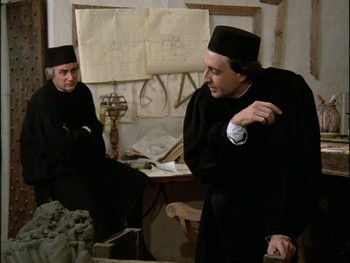
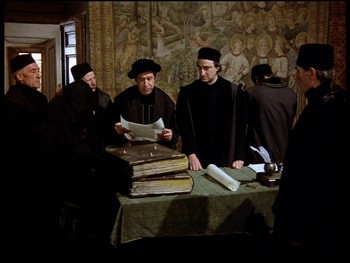
The Age of the Medici displays a lot of what I find tedious about these movies. This 1972 miniseries transports the audience back to fifteenth-century Florence when the Medici family was a leading force in artistic, social, and economic thought. The movie begins with a death at the head of the Medici empire and the assumption of control of the banks by Cosimo de' Medici (Marcello Di Falco). International trade is affected by the switch over, and there are also social ramifications since there is also a costly war being waged at the same time. All of this will factor into new ways of commerce being explored and new ideas being encouraged in all aspects of life, the driving force of the Renaissance.
While most filmmakers would take us away from the banking and show us the war to give us the contrast of the two aspects, Rossellini is not concerned with such overly dramatic settings. Rather, his story, co-written by the director with Luciano Scaffa and Marcella Mariani, is more about the exchange of information, the fomenting of dissent, and how decisions are made. In one sense, he is heeding the advice given to Woodward and Bernstein in All the President's Men, and Rossellini is following the money. Where the Medici money goes is of utmost importance to how Florentine society progresses. Yet, unless you're extremely fascinated by unadorned discussions of trade agreements and political ceremony, then The Age of the Medici can be quite a long and dull affair. These movies are often described as paintings from the period brought to life, and most of this film moves as if it were still stuck in the frame, on a wall, in a museum.
Admittedly, these are rather simplistic terms in which to describe a far more complicated tale, but at the same time, to get into further detail won't really do it justice either. It would be like reading a summary of a summary, little more than the same kind of long, expository monologue that so frequently stops The Age of the Medici and the other films in their tracks, working counter to Rossellini's desired naturalism in how unnatural the chunky explanations sound. Most of the time, I felt like I should be taking notes just to keep track, in case Rossellini was going to pop a quiz on me at the end. He's not a teacher that waits for you to keep up. There are no dates put on the screen, no clear introductions of the various famous players, foreknowledge is assumed.
The Age of the Medici, at least for me, gets far more accessible when it focuses on architectural designer and theorist Leon Battista Alberti (Virginio Gazzolo). The third episode is almost entirely given to him, but the shift begins in the second, when Alberti begins to explain how he believes all things intersect. Commerce, art, architecture--one funnels into the other in the pursuit of greater knowledge and human advancement. In this figure, Rossellini has found his true hero, a man who is always exploring and seeking greater truths; basically, a kind of avatar for the director in terms of what he wanted to do with his historical films. Statues, buildings, cinema--all things build on the past, forever moving forward.
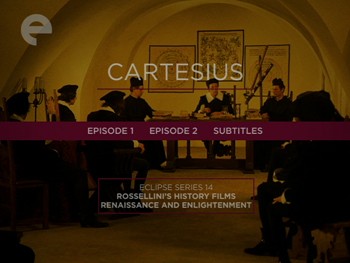
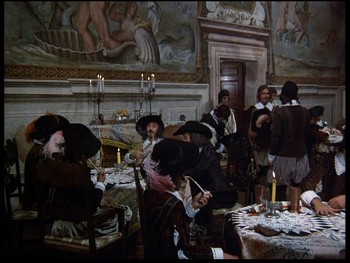
Rossellini finds the same kind of hero in Rene Descartes (Ugo Cardea), the subject of his two-part 1974 effort, Cartesius. The man who uttered the immortal phrase, "I think, therefore I am," is like an engine of reason, a human machine that is constantly seeking newer and better ways of understanding. The film follows him from his school days to his joining French society, on to war in Holland, and beyond to visit scholars all across Europe. In each environment, Descartes engages the thinkers of the day, challenging the ideas of our perception and trying to find a balance between the religion that fires a man's soul and the science of provable truth.
Thus, Cartesius is one long string of debates, both philosophical and mathematic. Perhaps it's the more firm placing of the story in the realm of ideas that appeals to me over the more exacting exploration of fiduciary progression, but I was able to get into Cartesius more as a viewer than I was Medici. With very little added exposition, Rossellini is able to use Descartes' disagreements with religious figures and the possible consequences of such (the film opens with an argument about Galileo) to illustrate how intellectual discovery is essential to social progression, but also how it can be dangerous. Going against the status quo requires as much bravery as carrying a weapon into battle. In that same vein, Rossellini lets simple metaphors emerge from the circumstances of Descartes' life. His physical wandering is connected to his mental wandering, and the masked death doctors dispensing with the bodies that have succumbed to the plague can be seen to represent the superstition of the past that allows intellectual plagues to fester just as much as physical ones. (One doubter expresses his dismay that a telescope reveals previously unknown stars and planets because it has destroyed the fabric of astrology.)
There is a sort of strange comfort in the fact that even a life like that of Rene Descartes is subject to certain normal patterns. Eventually, even as his pursuit of the understanding of the foundation of man and the universe continues, other aspects of living, including birth and death, intrude. There is a sweet, romantic irony in the fact that he falls in love with a maid (Anne Pouchie) who can't read and is prone to pithy homilies. Eventually, as well, Descartes succumbs to feeling, to nurturing those aspects of his being that rest outside of the intellect, even as he uses the intellect to deal with them. Fittingly, as in his film on Louis XIV, Rossellini ends Cartesius with a slow zoom on his subject, getting ever closer to the man and his friend as he explains his most common of decisions. So, too, is it fitting that not long before, when he utters his best-known quote for the first time, it is done almost in passing, as part of a greater discourse, as if the most obvious conclusion of all.
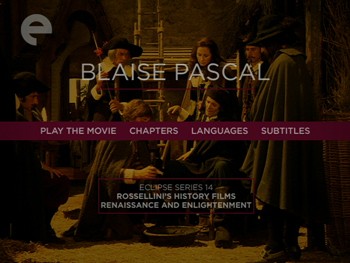
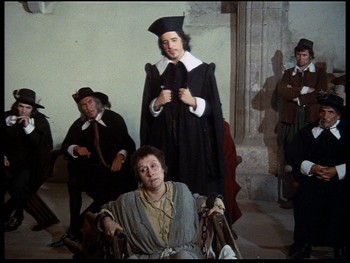
The films cross over in the 1972 production Blaise Pascal, when the titular mathematician and scientist (Pierre Arditi) meets Rene Descartes (here played by an uncredited actor), a fictional encounter that illuminates the differences in thinking between the two innovators. In this film, Descartes is portrayed as tired, distracted, and not altogether sure of himself. Blaise Pascal admires him but objects to his valuing man's reason above all things, thinking that the presumption of individual knowledge leads one astray. It is not our intellect that leads us to greater discovery, but science is a merely a method by which we get closer to God and the wisdom he has left for us to find.
Once again, the normalcy of everyday life is emphasized, and Pascal is almost the antithesis to Descartes in that lifelong illnesses keep him close to home, rather than wandering in search of new experience and knowledge the way his contemporary did. In some ways, Descartes was able to stay one step ahead of superstition and church-endorsed prejudice, whereas the protagonist here is witness to witch trials and a Jesuit-led attack on a particular branch of worship that ultimately leads to the death of his sister, Jacqueline (Rita Forzano). We are shown Pascal's advances in terms of measuring air pressure, as well as his program for public transportation, but within that is a man struggling with his faith, trying to divine God's plan and not let his own curiosity divert him from his proper moral path. It's fascinating to realize how long organized religion has discouraged man from questioning his own fate.
Certainly interesting ideas are raised in both Cartesius and Blaise Pascal, and the staging is more involving than that of The Age of the Medici, but that doesn't really push either over the hump for me. Even the injection of the very small romance subplot in Cartesius and the family drama of Blaise, his sister, and their father, the esteemed Etienne Pascal (Giuseppe Addobbati), doesn't really elevate the drama; rather, these things are more like incidental sidebars that tease me with the more varied storytelling I long for. Others, obviously, will disagree, and see Roberto Rossellini's refraining from conventional dramaturgy as a liberating decision, allowing for a cinema valuing ideas over sentiment. Certainly the man's cinematic technique is hard to fault, as Rossellini's sense of color and construction never falters. Yet, even in the finest restaurants, the arrangement of the food on the plate can't make up for a flavorless meal, and ultimately, Rossellini's History Films: Renaissance and Enlightenment - Eclipse Series 14 had me looking around for a little added seasoning.
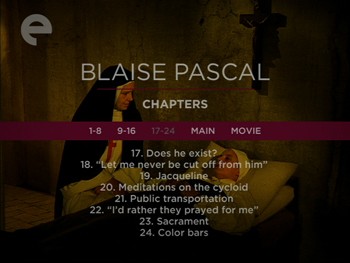
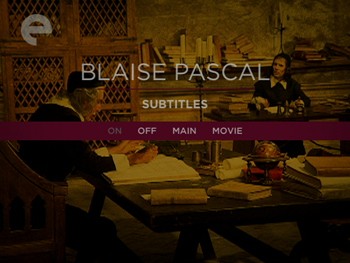
THE DVD
Video:
All of these movies were shot for television in the 1970s, so Criterion has preserved their 1.33:1 aspect ratio, presenting them at full frame. The transfers are of fairly average quality for old television. The pictures are not particularly sharp, but they also aren't overly plagued with an exorbitant amount of scratches or dirt. There are problem places, but none so egregious they should hamper your ability to watch the programs. The less-than-vibrant colors and grain are also partially indicative of the time.
Sound:
The three programs featured in Rossellini's History Films: Renaissance and Enlightenment are given monaural mixes, but they all have a variety of language options depending on who the films were made for.
The Age of the Medici was shot with Italian actors speaking English, so as to hopefully appeal to American PBS affiliates, though since it was an Italian production, direct sound was not used and so the dialogue was dubbed later. We get both the English version and the Italian dub here, with the latter featuring English subtitles. These soundtracks are fine, with some wonky spots on the English track where the sound does waver at times.
Though filmed with the actors speaking in French, Cartesius was rejected by French television and was only ever dubbed in Italian. The soundtrack is actually pretty good, and it did not suffer from any glitches like I heard on Medici. Mono mixes are pretty straight ahead with no frills, anyway. The subtitles flowed nicely, which was necessary given the big chunks of philosophical thought being tossed about.
Blaise Pascal was also shot with most of the actors speaking French, and this time it was actually dubbed in French, as well. Criterion gives the choice between that version and the Italian soundtrack.
Extras:
In keeping with the Eclipse Series credo, these films are presented without frills, the only extras being liner notes accompanying each selection. The programs are housed in their own plastic slimline cases which are then slid into an outer box that loads on top or bottom.
FINAL THOUGHTS:
There are, I am sure, many heated arguments and disagreements to be had over the value of this new boxed set, Rossellini's History Films: Renaissance and Enlightenment - Eclipse Series 14--debates as heated as those featured in the three films contained herein. These television productions, made by Roberto Rossellini as the final phase of his career, attempt to recreate the historical events that lead to great advances in human thinking. Cosimo de' Medici, Rene Descartes, and Blaise Pascal were all great men with important ideas, and Rossellini puts those ideas front and center, leaving the personal dramas of the standard biopic for others to relate. For everyone who applauds this decision, however, there will be one or two more that, like me, will wish he hadn't cooked out all the flavor. Rent It, and decide for yourself.
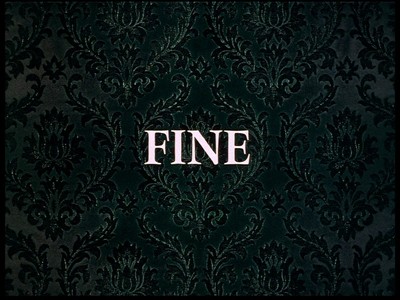
Jamie S. Rich is a novelist and comic book writer. He is best known for his collaborations with Joelle Jones, including the hardboiled crime comic book You Have Killed Me, the challenging romance 12 Reasons Why I Love Her, and the 2007 prose novel Have You Seen the Horizon Lately?, for which Jones did the cover. All three were published by Oni Press. His most recent projects include the futuristic romance A Boy and a Girl with Natalie Nourigat; Archer Coe and the Thousand Natural Shocks, a loopy crime tale drawn by Dan Christensen; and the horror miniseries Madame Frankenstein, a collaboration with Megan Levens. Follow Rich's blog at Confessions123.com.
|
| Popular Reviews |
| Sponsored Links |
|
|
| Sponsored Links |
|
|
| Release List | Reviews | Shop | Newsletter | Forum | DVD Giveaways | Blu-Ray | Advertise |
|
Copyright 2024 DVDTalk.com All Rights Reserved. Legal Info, Privacy Policy, Terms of Use,
Manage Preferences,
Your Privacy Choices | |||||||









